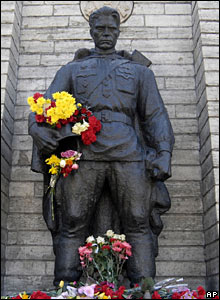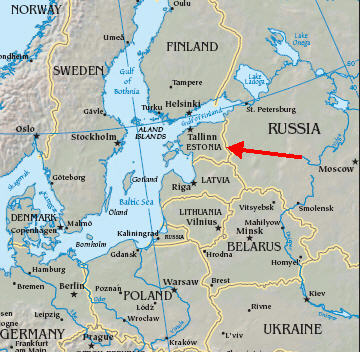
Dynamics

|
Generational Dynamics |
| Forecasting America's Destiny ... and the World's | |
| HOME WEB LOG COUNTRY WIKI COMMENT FORUM DOWNLOADS ABOUT | |
Some of the harshest World War II memories are being stirred, thanks to an Estonian government decision to move a controversial statue that honors Soviet soldiers who defeated the Nazis.
 |
The riots began on Thursday evening in the capital city Talinn, where the statue is located, and spread to other Estonian cities on Friday evening. There were hundreds of injuries, and dozens of ethnic Russians have been arrested.
The statue was located near a busy intersection in the heart of Talinn, and has created a public order problem, according to Estonian officials, because it is flash point between Estonian and Russian nationalists. The plan is to move the statue to a military cemetary on the outskirts of the city, and also to dig up and move the graves of Russian soldiers buried near the statue. The statue was moved to an undisclosed location in the middle of the night on Friday morning.
Estonia was the "Estonian Soviet Socialist Republic" until 1991, when it gained independence from the Soviet Union. Ethnic Russians, which make up 25% of the population, have complained about discrimination since then, and conflicts between Estonians and Russians have been increasing. At the same time, relations between Estonia and Russia have been getting less cordial. Today, Estonia is part of the European Union, and relations between Russia and the EU have been getting less cordial as well.
Estonians as a distinct ethnic group have existed for millennia, but they have been surrounded by hostile powers. Denmark took control with the Battle of Lyndanisse in 1219, and shared control with the Germans, reducing the Estonians to serfs.
From the Estonian point of view, the seminal battle of the last millennium was St. George's Night Uprising, occurring on April 23, 1343. In this genocidal crisis war, Estonian peasants killed thousands of Germans, their masters and landlords. However, the Germans reestablished control by 1346.
 |
The Livonian War in 1561 gave control of Estonia to Sweden. The Great Northern War of 1721 imposed Russian rule on Estonia. In the mid to late 1800s, an Estonian nationalism developed, and the Republic of Estonia was proclaimed on February 24, 1918, after the Bolshevik Revolution ended Tsarist Russia.
The period that's being relived today began in 1940, when Josef Stalin's Red Army reoccupied Estonia in June 1940, and made it part of the Soviet Union. On a one-night operation, June 13-14, 1941, thousands of Estonians, mostly women and children, were deported to Siberia, while tens of thousands of men were forcibly relocated to Russia to fight in the army. This period of bloody Soviet rule left a deep mark on the Estonians, and so the German Nazis who invaded later in 1941 were greeted as liberators. The Nazis were just as brutal as the Soviets, but when the Red Army returned in September, 1944, some 70,000 Estonians fled the country, and formed a diaspora throughout Europe and North America. After the war, Stalin's Soviet brutality continued as before the war.
Estonia remained under Soviet control until the days of the "Riga Barricades" in 1991. Soviet tanks and paratroopers first killed protesters in Vilnius, the capital of Lithuania, and then in Riga, the capital of Latvia, after the people had built concrete barricades all around Riga to stop the Soviet army. In the end, as the Soviet Union collapsed, the three Baltic states became independent nations.
Today, as Estonia is well into a new generational Crisis era, it is haunted by ghosts of "Nazi sympathizers" who opposed the Soviets, and a substantial Russian minority, mainly descendants of Russians whom Stalin had forced to relocate to Estonia after the war, and who consider themselves to be victims as well.
From the point of view of Generational Dynamics, this is a familiar
fault line situation that leads to a new genocidal crisis war. In
fact, there is a similar fault line between ethnic Russians and
natives of other former Soviet satellite countries, including
Ukraine, Georgia, Tajikistan and Kazakhstan. Generational Dynamics
predicts that, in this region of the world, these will all be
important fault lines in the Clash of Civilizations world war.
(28-Apr-07)
Permanent Link
Receive daily World View columns by e-mail
Donate to Generational Dynamics via PayPal
Web Log Summary - 2016
Web Log Summary - 2015
Web Log Summary - 2014
Web Log Summary - 2013
Web Log Summary - 2012
Web Log Summary - 2011
Web Log Summary - 2010
Web Log Summary - 2009
Web Log Summary - 2008
Web Log Summary - 2007
Web Log Summary - 2006
Web Log Summary - 2005
Web Log Summary - 2004
Web Log - December, 2016
Web Log - November, 2016
Web Log - October, 2016
Web Log - September, 2016
Web Log - August, 2016
Web Log - July, 2016
Web Log - June, 2016
Web Log - May, 2016
Web Log - April, 2016
Web Log - March, 2016
Web Log - February, 2016
Web Log - January, 2016
Web Log - December, 2015
Web Log - November, 2015
Web Log - October, 2015
Web Log - September, 2015
Web Log - August, 2015
Web Log - July, 2015
Web Log - June, 2015
Web Log - May, 2015
Web Log - April, 2015
Web Log - March, 2015
Web Log - February, 2015
Web Log - January, 2015
Web Log - December, 2014
Web Log - November, 2014
Web Log - October, 2014
Web Log - September, 2014
Web Log - August, 2014
Web Log - July, 2014
Web Log - June, 2014
Web Log - May, 2014
Web Log - April, 2014
Web Log - March, 2014
Web Log - February, 2014
Web Log - January, 2014
Web Log - December, 2013
Web Log - November, 2013
Web Log - October, 2013
Web Log - September, 2013
Web Log - August, 2013
Web Log - July, 2013
Web Log - June, 2013
Web Log - May, 2013
Web Log - April, 2013
Web Log - March, 2013
Web Log - February, 2013
Web Log - January, 2013
Web Log - December, 2012
Web Log - November, 2012
Web Log - October, 2012
Web Log - September, 2012
Web Log - August, 2012
Web Log - July, 2012
Web Log - June, 2012
Web Log - May, 2012
Web Log - April, 2012
Web Log - March, 2012
Web Log - February, 2012
Web Log - January, 2012
Web Log - December, 2011
Web Log - November, 2011
Web Log - October, 2011
Web Log - September, 2011
Web Log - August, 2011
Web Log - July, 2011
Web Log - June, 2011
Web Log - May, 2011
Web Log - April, 2011
Web Log - March, 2011
Web Log - February, 2011
Web Log - January, 2011
Web Log - December, 2010
Web Log - November, 2010
Web Log - October, 2010
Web Log - September, 2010
Web Log - August, 2010
Web Log - July, 2010
Web Log - June, 2010
Web Log - May, 2010
Web Log - April, 2010
Web Log - March, 2010
Web Log - February, 2010
Web Log - January, 2010
Web Log - December, 2009
Web Log - November, 2009
Web Log - October, 2009
Web Log - September, 2009
Web Log - August, 2009
Web Log - July, 2009
Web Log - June, 2009
Web Log - May, 2009
Web Log - April, 2009
Web Log - March, 2009
Web Log - February, 2009
Web Log - January, 2009
Web Log - December, 2008
Web Log - November, 2008
Web Log - October, 2008
Web Log - September, 2008
Web Log - August, 2008
Web Log - July, 2008
Web Log - June, 2008
Web Log - May, 2008
Web Log - April, 2008
Web Log - March, 2008
Web Log - February, 2008
Web Log - January, 2008
Web Log - December, 2007
Web Log - November, 2007
Web Log - October, 2007
Web Log - September, 2007
Web Log - August, 2007
Web Log - July, 2007
Web Log - June, 2007
Web Log - May, 2007
Web Log - April, 2007
Web Log - March, 2007
Web Log - February, 2007
Web Log - January, 2007
Web Log - December, 2006
Web Log - November, 2006
Web Log - October, 2006
Web Log - September, 2006
Web Log - August, 2006
Web Log - July, 2006
Web Log - June, 2006
Web Log - May, 2006
Web Log - April, 2006
Web Log - March, 2006
Web Log - February, 2006
Web Log - January, 2006
Web Log - December, 2005
Web Log - November, 2005
Web Log - October, 2005
Web Log - September, 2005
Web Log - August, 2005
Web Log - July, 2005
Web Log - June, 2005
Web Log - May, 2005
Web Log - April, 2005
Web Log - March, 2005
Web Log - February, 2005
Web Log - January, 2005
Web Log - December, 2004
Web Log - November, 2004
Web Log - October, 2004
Web Log - September, 2004
Web Log - August, 2004
Web Log - July, 2004
Web Log - June, 2004